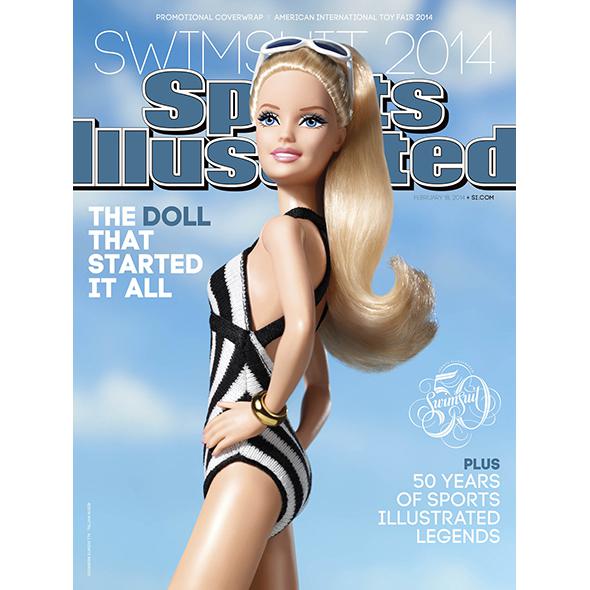For its 50th-anniversary swimsuit issue, Sports Illustrated decided to partner with Mattel on a cover wrap featuring everyone’s favorite swimsuit model, Barbie. The New York Times reports on this very strange marketing campaign, which is centered around the word unapologetic and will include a four-page advertorial in the magazine and a “Barbie Beach House Party” the night before the issue debuts:
“Unapologetic,” the theme of the campaign, is underlined by its use, with a hashtag in front, in social media like Twitter, as well as on a billboard in Times Square. “As a legend herself, and under constant criticism about her body and how she looks, posing in” the issue “gives Barbie and her fellow legends an opportunity to own who they are, celebrate what they have done and be #unapologetic,” Mattel said in a statement on Tuesday.
Barbie, being a doll, cannot feel apologetic, so presumably what Mattel means by this is that Mattel is unapologetic. About what, exactly? From the press release, it appears Mattel is pre-emptively telling mothers, feminists, and feminists who are mothers to screw off if they think Barbie sends troubling body-image messages to young girls. Same goes for all the judgments about Barbie’s “fellow legends,” which in this context must mean SI swimsuit models (who, it should be said, can feel and can speak for themselves). It’s a bold move on Mattel’s part to co-opt the debate that always rears up when the latest swimsuit issue comes out by vilifying the people who make the criticism before they even do. And it’s amusing to watch them take on the language of their critics—stop body-shaming Barbie and Christie Brinkley!—to do so.
Not that it seems to have stopped anyone, of course. As Stuart Elliott of the New York Times reports, the blogs are already fired up debating this, with Mommyish aggressively headlining a piece, “The Sport’s Illustrated Swimsuit Issue Will Feature Barbie, So Your Daughter Can Feel Bad Too.”
With this collaboration, Mattel and Sports Illustrated have, intentionally or not, guaranteed that most of the discussion about Barbie and the swimsuit issue will be focused around body image and beauty standards. Which works out pretty well for SI, at least, because it ends up distracting from the bigger issue, which is the troubling question of why there is still a swimsuit issue, a relic of a time when women’s sports were treated as a novelty, in the first place. Elliott writes:
Mattel is trying to do for Barbie what Sports Illustrated has sought to do for years on behalf of the issue: leave behind perceptions of babes in bathing suits and compare Barbie to swimsuit alumna like Ms. Banks, Ms. Brinkley, Kathy Ireland and Heidi Klum, who are celebrated for their accomplishments as entrepreneurs and career women.
I don’t know who is supposed to be fooled with the phrase “their accomplishments as entrepreneurs and career women.” What, exactly, has Barbie accomplished that we are supposed to celebrate her for? And also: Those highly successful women were on the covers because they’re hot, not because of their business acumen and certainly not because of their accomplishments in the field of sports, which Sports Illustrated supposedly reports on. The annual swimsuit issue, one of the few opportunities women even have to get on the cover, at least used to be able to pretend its existence had something to do with bathing suits as sportswear. By bringing Barbie into this, SI has given up completely on the already very thin pretense that there’s a relationship between the swimsuit issue and the concept of “sports” at all.
The timing, though, is great: The issue debuts on Tuesday, during the Olympics, when you can turn on NBC any given night and see women doing remarkable things while playing actual sports. This should make it crystal clear that the question we need to ask is not, “Why is Barbie on the cover?” But rather, why are nonathlete women on the cover at all? Unfortunately, with this genius marketing move, instead we’re talking about a doll that will not apologize. And that will be available for purchase at Target.com soon.
